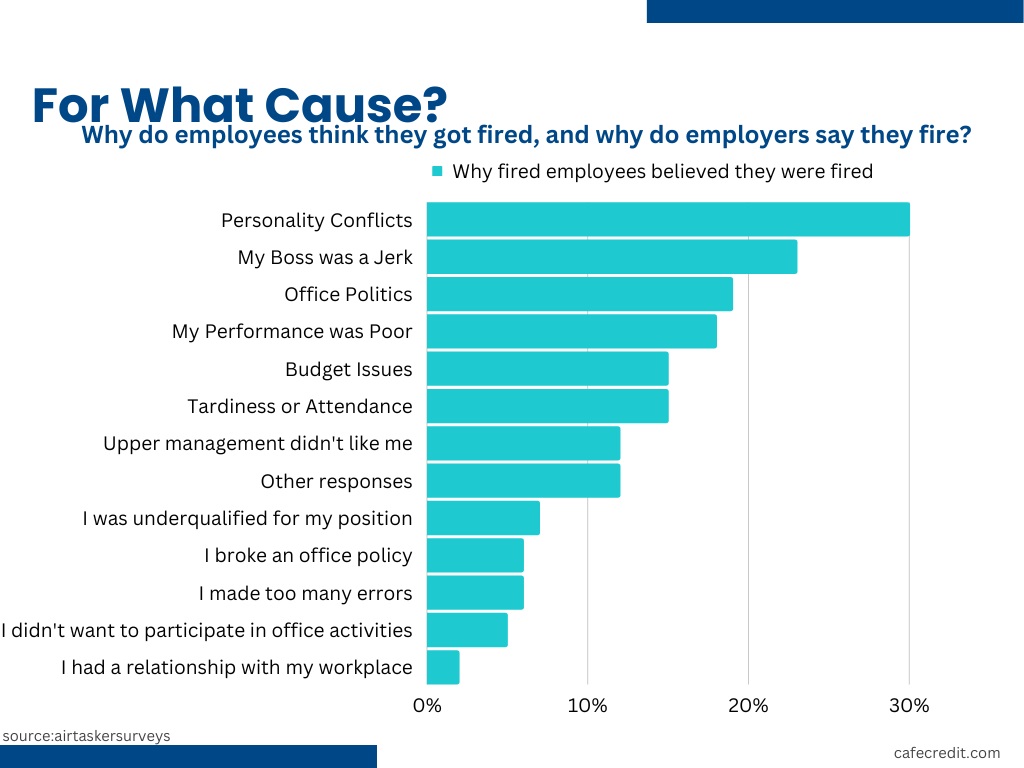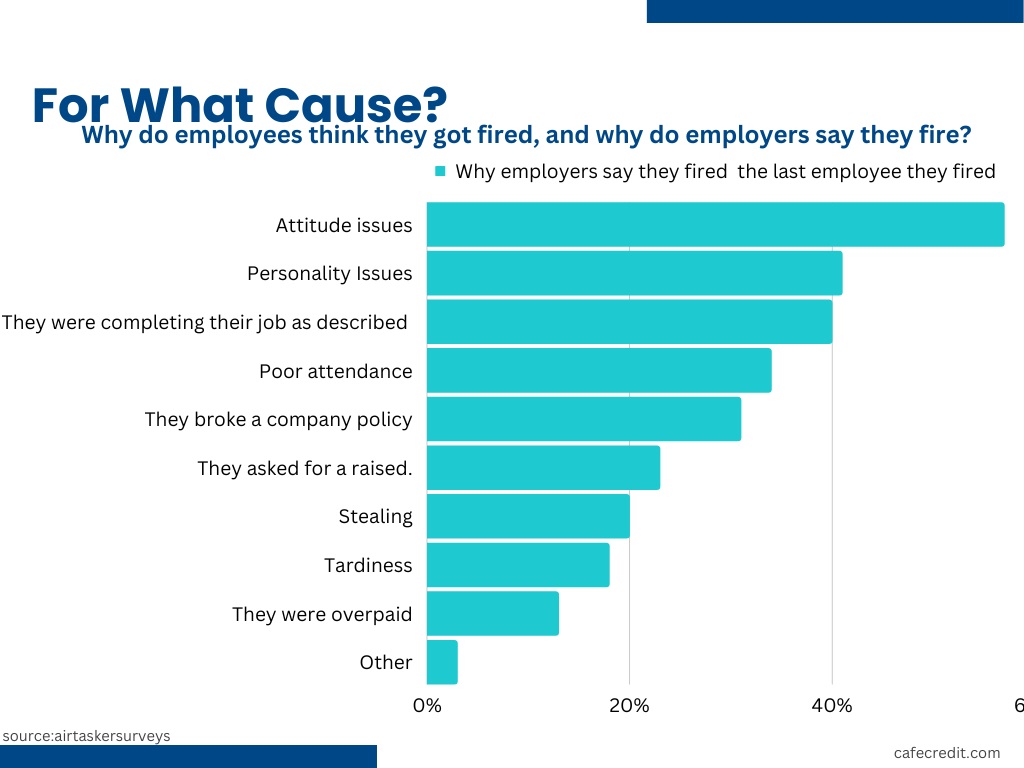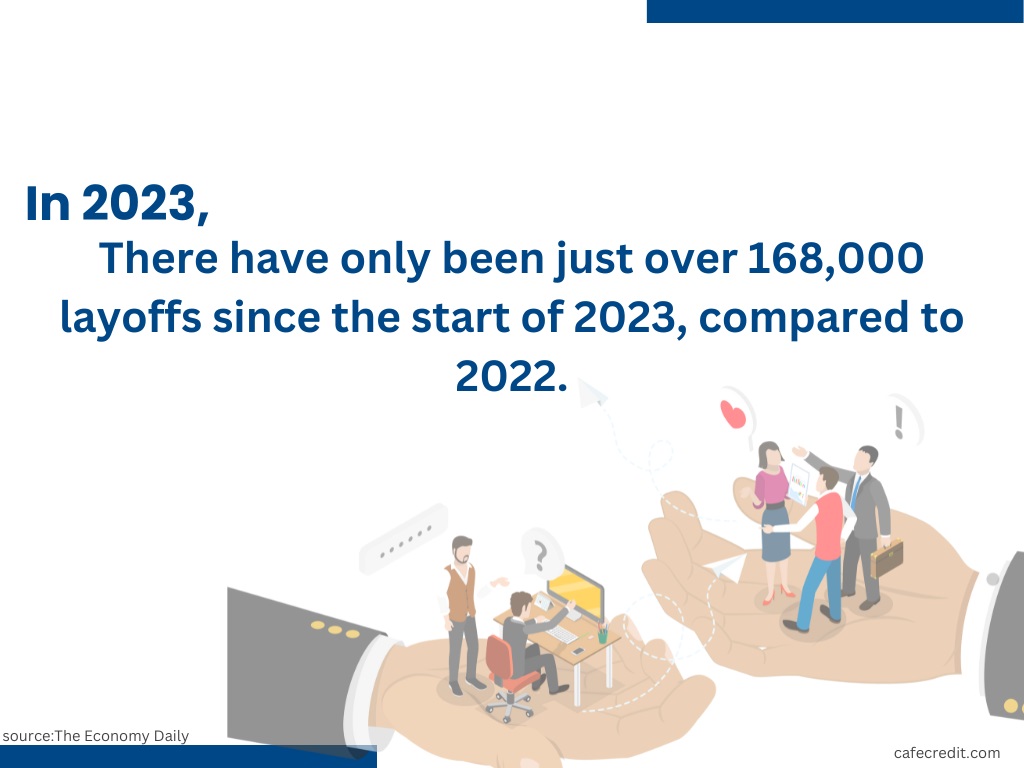Losing Your Job Doesn’t Spell the End of Your Career:
Workers and employers hold slightly divergent views regarding the factors that lead to individuals losing their employment.
Individuals who were terminated from their jobs attribute their dismissals to personality conflicts (30% consider it a primary factor), complex relationships with their superiors (23%), office politics (19%), and subpar job performance (18%).
Employers indicate that the most recent employees they let go were primarily terminated due to attitude problems (57% identified this as a critical reason), personality issues (41%), failure to fulfill job expectations (40%), and chronic attendance issues (34%).


Related Post:
Key Points
- Individuals who have been fired attribute their job loss to personality conflicts (30%), challenging relationships with superiors (23%), office politics (19%), and subpar job performance (18%).
- Employers state that the most common reasons for employee terminations are attitude problems (57%), personality issues (41%), failure to meet job expectations (40%), and chronic attendance issues (34%).
- The year 2023 has seen over 168,000 layoffs in the United States, with 40% of Americans experiencing at least one job loss in their careers.
- A substantial 48% of Americans report experiencing anxiety related to potential layoffs, and 28% have faced job terminations in the past two years.
- Nearly 23% of new hires leave their positions within their first year and 46% face failure within 18 months.
- 78% of job seekers exaggerate their qualifications during the hiring process, including falsely claiming skills and education.
LAYOFF STATISTICS 2023
Job layoffs are a source of concern that can make almost anyone feel uneasy occasionally. Whether it’s a case of oversleeping and arriving at work a little late or making a significant error while learning a new task, the prospect of facing a layoff can be anxiety-inducing.
However, it’s worth delving into the prevalence of layoffs in the United States. Fortunately, we have thoroughly explored crucial details about American releases, and based on our extensive research:
From the beginning of 2023 up to the present, there have been slightly more than 168,000 layoffs.
- A significant 40% of Americans have experienced at least one layoff or termination from a job in their careers.
- A substantial 48% of Americans grapple with layoff-related anxiety.
- Over the past two years alone, 28% of Americans have endured a layoff.
For a more detailed analysis, we further dissected the data in the following ways:

Close to 23% of Newly Hired Employees Depart from their Positions Before Reaching their First Anniversary
While many companies employ thorough interview and candidate vetting processes, it remains challenging to predict whether a new hire will thrive in their role. An astonishing 23% of new hires experience turnover within their first year, and a substantial 46% of all new hires face failure before completing 18 months in their positions.
A Substantial 78% of Job Seekers Tend to Exaggerate or Misrepresent their Qualifications During the Hiring Process
These misrepresentations often involve claiming mastery of skills they may not possess (like Excel or a foreign language), inflating their GPA, extending the duration of their employment at a previous company, or falsely asserting that they obtained a degree from a prestigious university when, in reality, they may have only taken an online course.
An Overwhelming 96% of HR and Hiring Professionals Acknowledge the Significance of Employee Experience
The traditional notion of employees conforming to employer demands has evolved. Today, organizations are under increased pressure to comprehend and actively invest in their workforce to enhance the overall employee experience.
An Impressive 81% of Talent Professionals Agree that Virtual Recruiting is Here to Stay
The prevalence of virtual hiring has been on the rise, significantly influenced by the transformative impact of COVID-19 on the organizational landscape and work dynamics. In the current landscape, 81% of recruiters foresee the continuation of virtual recruiting beyond the pandemic, with an additional 70% believing that virtual recruiting will evolve into the new standard for the industry.
A Significant 39% of Employees Express the Possibility of Resigning if they Were Compelled to Work in a Traditional Office Environment on a Full-time Basis
The future of remote work remains uncertain as it undergoes shifts and adjustments. Previous reports indicate that in May 2020, 35% of the workforce was engaged in remote work, yet this number dropped by more than half to 14% in June of the current year.
92% of Companies Have Embraced Utilizing Social Media to Research Job Candidates
Given the extensive time candidates invest in various social platforms, companies are leveraging this trend to broaden their talent pool. By promoting job opportunities on social media platforms such as Twitter or even TikTok, depending on the desired profile of potential applicants, organizations can enhance their chances of reaching and attracting qualified candidates.
Final Thoughts
In conclusion, the prospect of job loss and layoffs is a pervasive concern in the United States, affecting a substantial portion of the workforce. Over 168,000 releases have occurred in the year 2023, with 40% of Americans having experienced at least one job loss in their careers. This has led to a significant 48% of Americans grappling with layoff-related anxiety, and 28% have faced job terminations in the past two years.
Furthermore, the data reveals challenges in employee retention, with nearly 23% of new hires leaving their positions within their first year and 46% facing failure within 18 months. Job seekers also exaggerate their qualifications during the hiring process, with 78% inflating their skills and experiences.
The study highlights the growing importance of employee experience, the persistence of virtual recruiting, and the role of social media in talent acquisition. Overall, while job loss can be anxiety-inducing, it does not necessarily mark the end of one’s career, as many individuals successfully rebound from such setbacks.
